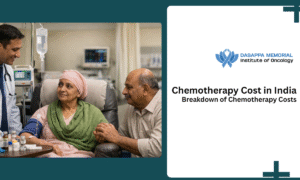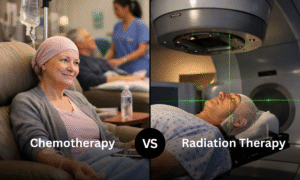Therapies of cancer have come a long way over the years. From traditional methods like chemotherapy and radiation therapy to advanced immunotherapy and precision medicine, patients now have a wider range of treatment choices than ever before.
At our cancer hospital in Bangalore, we understand how overwhelming it can feel when doctors present multiple treatment options. Each therapy comes with unique benefits, side effects, and purposes. Knowing what they mean helps patients and families make informed decisions.
In this blog, we will simplify the most important therapies, highlight the latest advances, and share what you need to know about cancer treatment today. Stay with us, some of these therapies may surprise you and give you hope for better recovery.
Why Multiple Therapies

There isn’t a single way to treat cancer. Instead, doctors combine different cancer treatment methods based on:
- The type and stage of cancer
- The patient’s age and overall health
- Whether the goal is cure, control, or relief from symptoms
Broadly, treatments may be used as:
- Primary therapy – the main method to remove or destroy cancer.
- Adjuvant therapy – given after the primary treatment to remove any remaining cancer cells.
- Neoadjuvant therapy – used before the main treatment to shrink tumors.
- Palliative therapy – focused on symptom relief and improving quality of life.
The Major Cancer Care Options
Most common cancer care options explained in simple terms:
| Therapy | What It Does | When It’s Used | Example Cancers |
| Chemotherapy | Uses strong drugs to kill fast-growing cancer cells | Often for blood cancers or widespread cancers | Leukemia, lymphoma, breast cancer |
| Radiation Therapy | Uses high-energy beams to destroy cancer DNA | For localized tumors or post-surgery | Brain tumors, head & neck cancers |
| Immunotherapy | Boosts the body’s immune system to fight cancer | For advanced or resistant cancers | Lung cancer, melanoma |
| Targeted Therapy | Attacks specific genetic changes in cancer cells | Personalized, based on molecular tests | Breast cancer, colon cancer |
| Surgery | Removes the tumor physically | Best for early-stage cancers | Stomach, colon, breast cancers |
| Stem Cell / Bone Marrow Transplant | Restores damaged bone marrow using healthy stem cells | Used in blood cancers | Leukemia, lymphoma, myeloma |
Chemotherapy: Still a Key Pillar
Chemotherapy is one of the oldest but still most powerful therapies. It works by interfering with cancer cells’ ability to grow and divide.
- It can be used as the main treatment or along with surgery and radiation.
- Side effects like nausea, hair loss, and fatigue are common, but modern medicines help reduce these.
- At the best blood cancer hospital in Bangalore, chemotherapy is often combined with a stem cell transplant for better long-term results.
Radiation Therapy: Targeted and Effective
Radiation therapy uses precise beams to damage the DNA of cancer cells, stopping them from growing.
- It can be external (from a machine) or internal (brachytherapy).
- Modern techniques allow highly accurate targeting, which means fewer side effects.
- For example, in a brain tumor hospital in Bangalore, advanced radiation is often used to treat tumors located in delicate areas where surgery may be risky.
Immunotherapy: The Game Changer
Unlike other treatments, immunotherapy does not attack the cancer directly. Instead, it empowers your immune system to recognize and destroy cancer cells.
- It is especially useful for cancers that don’t respond well to chemotherapy.
- For patients receiving care at a lung cancer treatment hospital, immunotherapy has shown remarkable improvement in survival rates.
- Side effects are generally milder, though the immune system may sometimes overreact.
Advances in Modern Cancer Treatment
Cancer therapies are becoming more refined, less invasive, and more effective. Some exciting advances include:
- Precision medicine: Using genetic testing to choose therapies tailored to each tumor.
- Targeted drugs: Medicines designed to block specific cancer cell mutations.
- Minimally invasive surgery: Smaller cuts, faster recovery, fewer complications.
- Advanced radiation techniques: Like stereotactic radiosurgery, which focuses radiation with pinpoint accuracy.
- Home-based treatments: Some therapies now allow patients to recover in the comfort of their homes with remote monitoring.
At a Cancer Hospital in Bangalore, patients benefit from these new approaches that combine innovation with compassionate care.
Tips for Patients Considering Therapy
- Stay informed: Always ask your doctor to explain about recommended therapy.
- Know the side effects: Understanding them helps you prepare mentally and physically.
- Seek support: Nutrition, mental health, and family involvement are as important as medical treatment.
- Second opinions matter: Don’t hesitate to consult another specialist if unsure.
- Stay hopeful: Advances are happening rapidly—what wasn’t possible a few years ago may be possible today.
Final Thoughts
Modern therapies of cancer are designed not just to cure but also to give patients the best quality of life during and after treatment. From chemotherapy to immunotherapy, the possibilities continue to expand.
At Dasappa Cancer Hospital, recognized as the Best Cancer Hospital in Bangalore, we believe in combining advanced science with compassionate care. For us, every patient deserves the right treatment, the right guidance, and the right hope.
FAQs on Cancer Therapies
1. What are the main therapies of cancer?
They include chemotherapy, radiation therapy, surgery, immunotherapy, targeted therapy, and bone marrow transplants. The choice depends on cancer type, stage, and patient health.
2. Is chemotherapy always necessary?
Not always. Some cancers respond better to radiation, surgery, or immunotherapy. Treatment plans are individualized to provide the maximum benefit with minimum side effects.
3. Can cancer be treated without surgery?
Yes. Many cancers are treated effectively with chemotherapy, radiation, immunotherapy, or a combination, especially when surgery is not safe or feasible.
4. What is the latest advance in cancer treatment?
Immunotherapy and precision-targeted therapies are the most promising advances, offering more personalized and less toxic treatment options.
5. How do I know which therapy is right for me?
Your doctor will assess your cancer’s type, stage, and genetic profile, then recommend the most suitable therapy. Always ask for a clear explanation of why it’s best for you.







